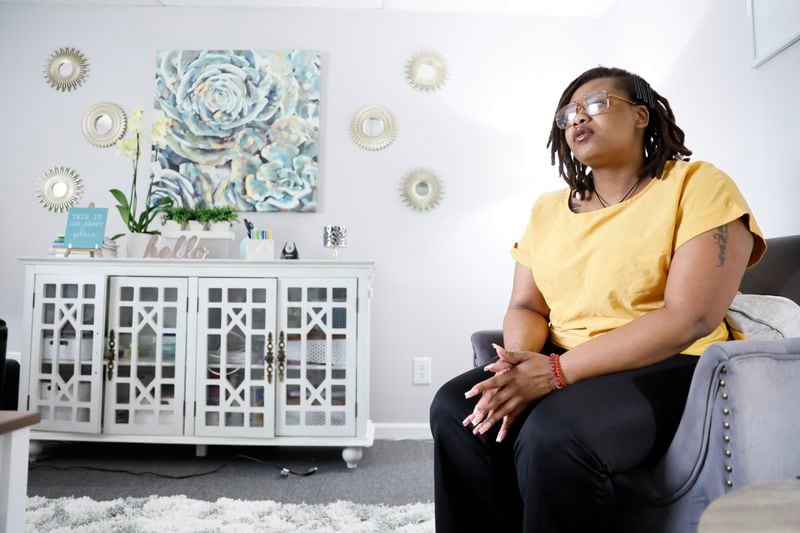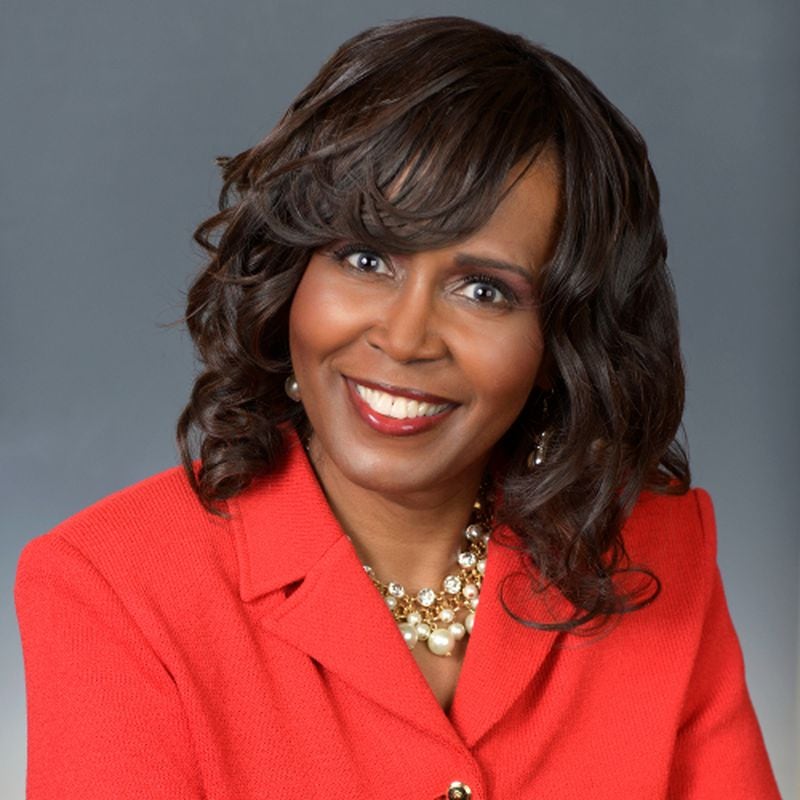For eight years of her young professional life, 26-year-old Kae’Chauna Sinclair has worked in the mental health field. Starting at age 15, however, Sinclair held what she considers to be “typical teenage jobs,” particularly in retail customer service, and she had no problem quitting them after short stints in the roles if she didn’t find the workplace met her conditions.
Her fiancé, Jeffrey Houston Jr., 27, also has walked away from his share of positions for that very reason.
The two are hardly the only ones to share a mindset that work that isn’t meeting their needs is work that isn’t worth committing to beyond more than a brief period.
They join others who are part of Generation Z, also known as “zoomers” and post-millennials — individuals born between 1997 and 2012, as defined by Pew Research Center. It’s a generation that Sinclair, a therapeutic life and relationship coach, said believes in “picking ourselves” when it comes to employment.
Zoomers are emotionally driven and “very specific” in terms of knowing their needs in the workplace, said Sinclair, who works on a contract basis for Healing Grounds Therapy and Wellness Center in Jonesboro. “And when those aren’t being met, even in your passion, you will run away.”
The native of Syracuse, New York, added, “We really care about how we feel and if we don’t align with something enough to even consider it a relationship of value, for us anyway, abandoning it makes sense. At the core of it all is it’s us that we’ve picked.”
Credit: Miguel Martinez
Credit: Miguel Martinez
Added Houston, 27, who is on the cusp of Generation Z, “Gen Zs really believe in putting ourselves first, and understanding that, yes, hard work is needed to get where we need to go. But if it’s not serving us a purpose, if it’s not aligned with where we’re going, then we’re not doing it,” said Houston, a musician and entrepreneur.
For a zoomer, abandoning a job can mean just that — not returning to work and not communicating those intentions to the employer. Some have left jobs by sending an email or through a social media post. Forget about the traditional two-week notice that most employers expect.
But zoomers are not alone in terms of dissatisfaction in the American workplace after the pandemic, political friction and social issues roiled the U.S. A 2023 Gallup workplace report pointed out that “quiet quitters” now make up at least 50 percent of the U.S. workforce. Gallup defined quiet quitting as “the idea spreading virally on social media that millions of people are not going above and beyond at work and just meeting their job description.”
Gallup noted a decline in engagement and employer satisfaction especially among Gen Z and younger millennials (those below age 35) working remotely. It noted that as “a significant change” from pre-pandemic years.
“Since the pandemic, younger workers have declined significantly in feeling cared about and having opportunities to develop — primarily from their manager,” the report indicated.
A major factor that Generation Z professionals point to when it comes to leaving jobs is “how we saw society before us,” Sinclair said. “We don’t want to be the way the adults ahead of us were,” she added. “We do not want to be our grandparents, working until they’re 65, 70 at shops and jobs, and for employers who treat them horribly, who don’t even give them the space [by saying], ‘Hey, look, this job is taxing on you mentally; take some time off.’ We don’t wanna be that.”
For Houston, it’s a matter of choosing something opposite of what he witnessed with his late father — working a job at which he was answering phone lines. “Personally, it comes from watching the older generation staying at jobs that they hate,” he said.
Management development professional and executive business coach Nancy Lewis said of Gen Z, “They will not stay in a job that they hate, like many Boomers did,” she said of Baby Boomers, those born between 1946 and 1964. “They’re not going to be in a job that they don’t like,” added Lewis, president of Fayetteville-based Progressive Techniques Inc. “They want to do something that’s meaningful, do something that’s gonna make you feel that you’re making a difference.”
That mentality and the idea that adults before them did not “pick themselves” has led many zoomers to create their own “spaces,” Sinclair said, for example, through independent contract work or as social media influencers. The latter, she points out, often make within a span of four years or less what someone of their parents’ generation made by the time they reached age 70.
Credit: Miguel Martinez
Credit: Miguel Martinez
But Sinclair makes it clear it’s not all about money. Having work-life balance, where an employee can take off outside of a paid holiday or sick day, such as for a “mental health day,” is important to zoomers.
“I work four or five days a week and if I don’t want to go to work one day or I’m not feeling good or I need just a mental health day, I [can] plan that,” Sinclair said. It just requires that she give her clients a week’s notice. “I could not do that at a regular 9 to 5.”
Sinclair added that zoomers do take into consideration that their way of doing things could be “viewed as disrespectful” or as if they “lack loyalty.” But choosing themselves comes first, with some even noting how employers don’t reciprocate what they expect — for instance, when workplaces let an employee go without notice or when a potential employer doesn’t convey the decision not to offer a candidate a position.
Sinclair said she is mindful of the importance of giving notice, as she did in the past. But she allows that one struggle for zoomers is not communicating “when we need assistance, or our needs aren’t being met.” Often the result is the employee walking away from a job.
Credit: Miguel Martinez
Credit: Miguel Martinez
Kaylor M. Bell, who works as an office assistant for a psychiatrist in Peachtree City and is separately a social media strategist and makeup artist, believes Gen Z employees should not walk away from a job before the three-month mark of employment.
Bell, 27, said zoomers should determine if a job is a good fit “before you’re in the role.” She suggests figuring that out upfront by asking good questions and researching the company.
“Once you accept the offer, I think you will always be faced with struggles and trials that you probably didn’t anticipate,” Bell said. “But that’s going to be with any opportunity that you have.”
Bell said she’s never left a position on short notice and that she feels a sense of loyalty when she’s working for a company, largely because of her Christian walk.
“I want to make sure that everything I’m doing is honorable, that everything I’m doing is just a good example,” Bell said. “I want to do everything I can to make sure an opportunity does not fit before I move on.”
Bell received a master’s degree in biomedical science from Morehouse School of Medicine in 2022 and plans to take the Medical College Admission Test this summer with the goal of rising to a career as a surgical oncologist.
Zoomers “will need some resilience” after taking a job, she advised. But if workers find after three months that an opportunity isn’t working, she added, “then it would be best for you and the company that you move on. Because you’re probably not doing a good job at what they need you to do, and apparently the company isn’t suited for you.”
Credit: Handout
Credit: Handout
Employment has a different face today, according to Lewis, who through her company advises public and private sector companies worldwide. Lewis said days of loyalty in the workplace are behind us.
“We’ll never go back to pre-pandemic days,” Lewis predicted. “The era of working 20 years for a company is gone, and I think that’s hard for organizations, especially the government, to handle.”
Speaking of Generation Z and in some cases millennials (the generation born between 1981 and 1996), she noted that some have gone through job interviews, “accepted the job and not shown up.” For those who do take the offer, “You might get them for two, three years. You might get them for six months. You might get them for six days.”
She advises employers that, “Millennials and zoomers need more attention. They need to know that they’re valued and appreciated. They need feedback on an ongoing basis.” Otherwise, they may “think they’re not doing a good job.” The need for feedback, she suggested, is in part due to helicopter parents — parents who insist on excessive levels of involvement and control in their children’s lives — “fixing stuff for them.”
For example, Lewis recounted instances where parents have gone on interviews with their young offspring. “They’ve been doted on, they’ve been spoiled, they’ve been highly loved. When they fail, it’s like, ‘That was a good fall.’” She added that some parents even will call an employer over an employee review and suggest that the boss hurt their child’s feelings.
Credit: Miguel Martinez
Credit: Miguel Martinez
Houston, who took a break from studies at Le Moyne College in Syracuse, New York, after his father died, has checked all the boxes covering the ways a zoomer will leave a job. He has put in a notice, stayed on a job for only a week and left without a notice. This includes when he quit his package-handler position with a major online retailer last October, after completing two weeks of eight-hour-a-day training then three days of work. He said he did so because he wasn’t “getting proper hours” or “anything that I’m asking for.” He exited two jobs before that due to similar concerns.
“It really ties into how I was treated and certain respect and boundaries that I have that are set up while I have a job,” Houston said.
After three years of college, where he majored in graphic design, Houston launched his own company, LeVII WORllD, in 2018. He sells merchandise such as clothing and works in music as a producer and engineer; he also sings and raps. He said he’s open to additional work and that he enjoys opportunities that allow him to be outdoors, preferring not to work inside for long hours.
Houston said that he and other zoomers don’t mind working more than one job or working on a contract basis, even if that means not having benefits such as vacation and health insurance.
After all, he said, companies give workers benefits for jobs that are “sending you to the hospital most of the time. Why would you do that to yourself for so long?”
He doesn’t regret choices he’s made, adding, “If you believe in yourself, it will come. If you work hard enough, it will come.”
For employers to retain employees, Lewis suggests that they recognize what Gen Z and other generations of workers need. “It’s not one size fits all. When you have a myriad of people on your team, you can’t do cookie cutter; it’s, ‘Who needs what?’ You must get to know your people at the appropriate level — ‘I know you need this. . .’ In the long run, it will gain you a team that will be more productive and perform at a higher level.”
Treating Gen Z differently, Sinclair and Houston said, includes recognizing their need for a life that includes more than work. And many are convinced their purpose includes shaking up “an entire system,” Sinclair added. The zoomers’ push for the workforce to look different, she and Houston said, is paving the way for generations to come. Those future workers, they believe, may benefit more from their efforts than zoomers themselves will.
As members of Gen Z are choosing themselves, Lewis urges that they not lose sight of the importance of relationships in their professional lives.
“Everything happens because of relationships,” she said. “If you don’t have to burn a bridge, don’t burn it.” She added that young professionals can seek assistance from coaches or mentors to help them navigate difficult career decisions.
“Everything that will happen, will happen through a relationship, and you never know who’s going to be able to open that next door for you,” Lewis said. “So, you want to make sure that you learn how to build relationships.”
Further, she reminds employers of the value of every employee, including those from Gen Z.
“Every generation brings something special to the workplace,” Sinclair said, “and we need to cultivate that.”
About the Author



![Kaylor M. Bell, an office assistant for a psychiatrist and, separately, a social media strategist and makeup artist, makes work notes at Urban Grind coffee shop. “I want to do everything I can to make sure [a work] opportunity does not fit before I move on,” she said.
Miguel Martinez /miguel.martinezjimenez@ajc.com](https://www.ajc.com/resizer/vK5pUYSlzqSowAD-myMOzc-gy4Q=/800x0/cloudfront-us-east-1.images.arcpublishing.com/ajc/GGXTJVUXBKFKZGY3ASEB4K7BMY.JPG)







